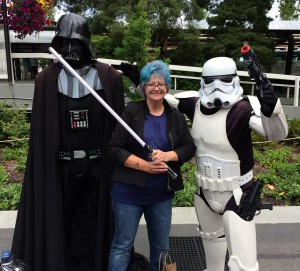 Back when I was VP of SFWA, Executive Director Kate Baker told me she had a dream. “I want to make the Nebula conference -the- premier conference for professional F&SF writers,” she said. “Something that no one wants to miss. A conference so good that if someone has budget for only one convention each year, that’s the one they know they’ll get the most value out of.”
Back when I was VP of SFWA, Executive Director Kate Baker told me she had a dream. “I want to make the Nebula conference -the- premier conference for professional F&SF writers,” she said. “Something that no one wants to miss. A conference so good that if someone has budget for only one convention each year, that’s the one they know they’ll get the most value out of.”
It seemed like a pretty good goal to me. After all, the Science Fiction & Fantasy Writers of America is over fifty years old, has close to 2000 members, including some pretty impressive names, has and continues to do major work in the field protecting professional F&SF writers, and gives out one set of the industry’s major awards as well as the recognition of the SFWA Grand Mastership.
It’s five years later, and in my opinion, Kate’s done what she set out to do. She didn’t do it alone, of course. She had the help of a whole lot of amazing SFWA staff and volunteers, including the amazing Terra LeMay and Steven H Silver. Mary Robinette Kowal got turned loose on programming the last couple of years and has been doing a stellar job. And others have made their mark with additions, such as the Nebula Award Alternate Universe Acceptance speeches or the mentoring program led by Sarah Pinsker or (I’d like to think) two I’ve contributed: the volunteer appreciation breakfast as well as the spouses and partners reception that have been regular features (and I hope will continue to do so!) Or the Book Depot, because I don’t know of ANY other con that takes as much care to make sure that its authors — including the indies — can sign and sell their books there. And there’s a fancy Nebula website, which remains a work in progress as more and more gets added to it, preserving the history of the Awards.
We’ve only got a small fraction of the schedule so far, with plenty of new stuff getting added every day, but here’s some highlights.
- Panels about interesting things that may lead to story ideas, like the Future of Death, Realistic Military in Fiction, and Megatrends in the Near Future.
- That mentoring program has grown every year, and now we do it at WorldCon as well. People new to the Nebulas can go knowing they’ll have someone there to explain stuff and fill them in on the etiquette of things as well as provide a friendly face and introduce them to people.
- Interesting, innovative programming that comes in a variety of forms, including the Ignite talks and office hours, stuff that ranges all over the place and includes things like deep dives into Facebook advertising or what life aboard a space station is like.
- A chance to explore some new areas of fiction, such as one of the several Interactive Fiction or Writing for Hollywood panels.
- Plenty of panels aimed at indies and hybrids like myself, including the Self-Publishing Committee Town Hall, which should have plenty of crunchy info about recent and upcoming self-publishing events.
- Panels that talk about practical things, such as combining parenthood and writing, productivity tools, or make-up basics for writers about to make media appearances.
- The yearly What Teens Are Looking For in YA is a great panel that features actual teens talking about what they like to read and how they discover it, which is always informative. I think this is the 5th year (?) for this panel.
- Memorials to a few of our lost greats, such as Ursula K. Le Guin and Vonda N. McIntyre. SFWA’s got a lot of history, and the Nebulas give us a chance to celebrate some of the folks we’ve lost each year.
I don’t mean to imply that the old version of the Nebulas was not what they promised to be. They were a chance to mingle and meet, but programming was usually slim and single track at best, and sometimes the topics were very broad indeed. They didn’t feel like a professional conference so much as a party. That’s fun, but it doesn’t give members stuff they actually need to be successful at what they do.
So…well done, Kate. You deserve a lot of applause for the effort you’ve led and you did exactly what you said you would do. The Nebulas now also stay within their budget, which is impressive, and has made enormous strides towards paying for itself, an important thing at a time when we see SFWA’s budget changing and adapting to the new publishing landscape.
It’s my last Nebula weekend as SFWA president, so I’ll be flitting around with a lot of relief on my face. Please say hi, but more importantly, please tell Kate and her team how much you’re enjoying the conference. I’m really going to miss working with this group of fabulous, amazing, talented people.









One Response